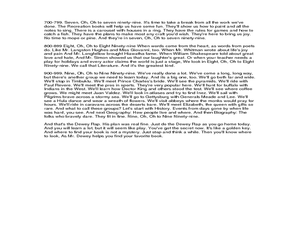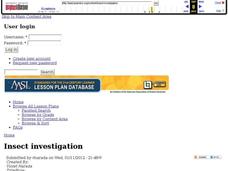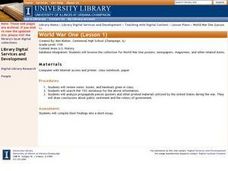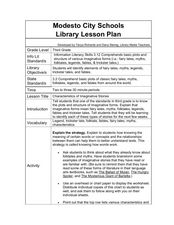Curated OER
Online Public Access Catalog
Fourth graders learn how to find books in the library. In this library lesson plan, 4th graders observe how to use an online system to search for a book by title, author and subject. Students practice searching for books.
Curated OER
Where is Grand Dewey Daddy?
Third graders find books. In this library lesson, 3rd graders use the Dewey Decimal System to find books and determine the shelves they are located on.
Curated OER
Dewey Rap
Fourth graders locate books in the library. In this Dewey Decimal System lesson, 4th graders listen to the Dewey Rap via power point or audio file. Students view a card from the Dewey system in their library and practice finding the book...
Curated OER
Glossary, Index, and Table of Contents
Fourth graders use two separate sources to learn about index, glossary, and table of contents usage. In this library lesson plan, 4th graders use two books, Learning About Weather with Graphic Organizers, and The World Almanac for Kids,...
Curated OER
Animal Report
Fourth graders explore the variety of resources available to them at the library. They utilize many of these resources to create an animal report with a set criterium.
Curated OER
Messages in Art Work
Observe images and discuss what messages they convey. In this critical thinking lesson plan, students determine whether works of art are trying to persuade their audience. They also consider the media and how they communicate messages to...
Curated OER
Insect Investigation
Investigation is a brilliant way to spark scientific inquiry. First graders will identify, research, and report what they have learned about a mysterious bug found on the playground. They will use multimedia resources for research and...
Curated OER
Immigration To Wisconsin
Fourth graders see why people came to Wisconsin and what life was like in their new home. They engage in a wonderful series of lessons, which use a variety of multi-media resources. They plan a heritage day party as a culminating event.
Curated OER
Who's The Boss?
Upper elementary and middle schoolers research and analyze some different types of governments. Democracies, Monarchies, and Dictatorships are some of the types that are looked at. Learners use the Internet to gather information that...
Shakespeare in American Life
Patriarchy in King Lear and As I Lay Dying
King Lear, “Papa Doc” Duvalier, Colonel Walter E. Kurtz and Anse Bundren? Imagine a unit that examines the tragic hero and patriarchy in King Lear, As I Lay Dying and Apocalypse Now. To liven the brew, learners are asked to include in...
Curated OER
How to Locate and Evaluate Information, Part I - Online Catalog
Using the online catalog, researchers locate and record on a citation template specific sources for their research paper. A library specialist models searching strategies while the teacher introduces the research paper process. Daily...
Curated OER
World War One- Lesson #1 of 3
Eleventh graders search an online database for World War I posters, newspapers, magazines and other media. They write an essay about public sentiment of the time based on the research.
Scholastic
It's a Whatchamacallit
Learners formulate new applications for simple machines in an original invention that solves a common problem. They brainstorm ideas for a new product using simple machines and communicate a finished project through an oral, written, and...
Curated OER
Recognizing Reference Sources
Fourth graders investigate five different reference sources in the Media Center: Atlas, Dictionary, Encyclopedia, Card Catalog (Look Up Station), and the Internet. They decide which is the BEST source to use to answer specific questions.
Curated OER
The Daily Idiom
What is an idiom? Learners identify and read common idioms. They discuss what idioms are, and are given a black line master embedded in the plan that has 100 common idioms. Next, they complete "The Daily Idiom" worksheet, which is...
University of New Mexico
ESL - Thematic Unit Plan
Students read a variety of poetry books together in small groups. They examine Haiku poetry and share their favorites. They write their own Haiku either individually in a pair. They read and discuss limericks and work on writing their own.
Curated OER
How to Locate and Evaluate Information, Part III - Internet Sites
This is the third in a series of lessons scaffolding the research paper. It purports to teach researchers how to evaluate internet sites, but the lack of links, specific criteria, or site evaluation rubrics would require additional...
Curated OER
The Fight to End "Separate but Equal" in American Schools
Students study the court cases related to Brown v. Board of Education and the "separate but equal" standard established by Plessy v. Ferguson. They create an informational display that can be used to teach others the particulars of the...
Curated OER
Teams in the Field
Students conduct team interviews outside the classroom, either within the school or beyond, as part of a fieldwork project. They use reasoning skills as they formulate questions, plan, predict, hypothesize, and speculate about the...
Curated OER
Are You Sure You've Got the Right Answer?
Young researchers work through the research cycle. They question, plan, gather, sort, synthesize, and evaluate the materials they collect at the library. There are web supplements for this lesson plan.
Curated OER
The age of majority: How old is old enough?
Young scholars research on the Web and in books the "age of majority" in general and how it applies in their particular states. Explore, too, "emancipation" and whether this is another way for teens to earn additional rights. Students...
Curated OER
Hip-Hop: A Journalist's View
Students watch a CNN television news special about hip-hop and write a review. Using the internet, they investigate the pros and cons of the music while interviewing students on their opinions. They examine the growth of this type of...
Curated OER
First Amendment Rights
Fifth graders participate in a problem-solving and decision-making process involving the First Amendment rights to analyze and implement a solution for a school-related issue. They are given a variety of scenarios to apply the First...
Curated OER
Characteristics of Imaginative Stories
Third graders explore genre characteristics. In this genre literacy lesson, 3rd graders listen to a variety of fiction stories and classify them according to genre. Students identify common features in each genre and complete a chart by...

























